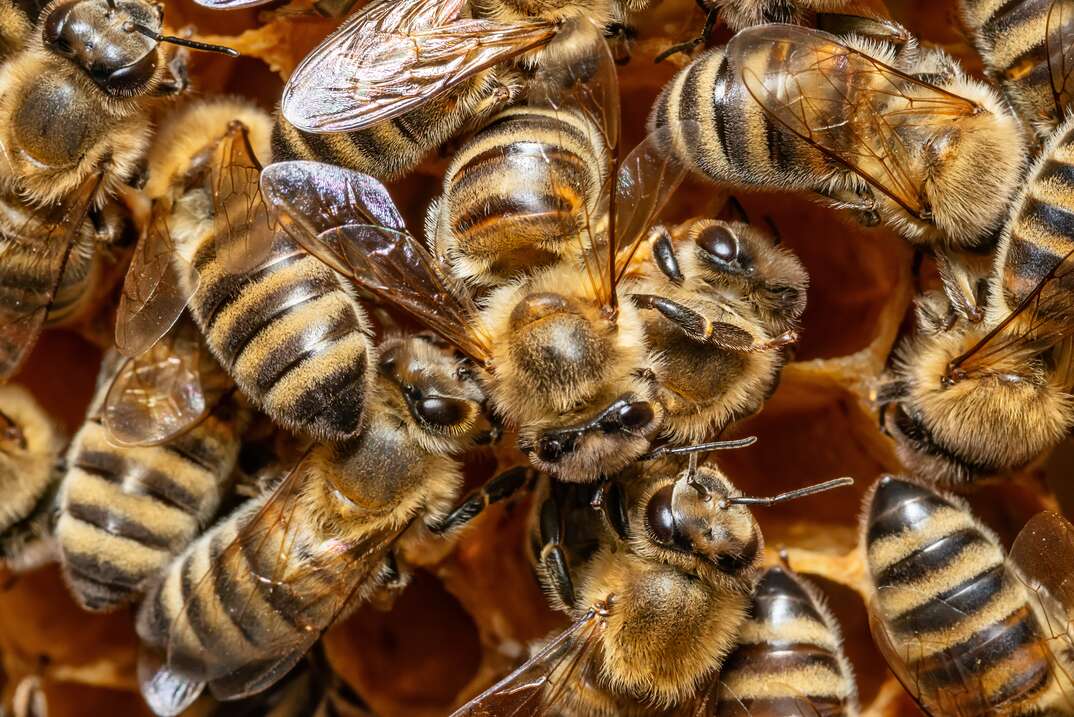- AppliancesElectriciansHVACLandscapingLocksmithPest ControlPlumbingRenovationRoofingT V RepairAll Home Improvement
- Car AccidentClass ActionCorporate LawCriminal DefenseDivorce LawEmployment LawFamily LawFinancial LawLegal AidMedical Injury LawyersMedical MalpracticeReal Estate LawWater Fire RestorationAll Legal
- InvestmentRetirementAll Finance
- Animal InsuranceAutoGeneral InsuranceHealth PolicyHome RentersAll Insurance
- DentalHealth SpecialistsAll Medical
- Animal CareVeterinaryAll Pets
- Auto GlassTowingAll Automotive
Can Exterminators Get Rid of Honeybees?

There may be nothing more disruptive to your outdoor space than a colony of honeybees in or near your house. These territorial pests can make it difficult to enjoy spending time outdoors.
Read More Pest Control Articles
Trying to remove a honeybee hive from your property can be both dangerous and difficult. It’s recommended to let a professional pest control company with experience in honeybee removal handle the task for you.
Honeybees are extremely social and can live in colonies of 20,000 to 60,000 bees in just one hive. While these large colonies can make it easier to spot a honeybee nest on your property, it can also make it more dangerous to get rid of them.
Honeybees don’t typically sting humans unprovoked, but they will sting to protect themselves or their hive. So, you might not want to go digging around looking for a beehive. Fortunately, there are other signs you can look for that might signify you have a honeybee problem, such as:
- Bees repeatedly enter the same location. Bees tend to build their hives close to the ground and in hollow spaces, such as old logs, abandoned animal burrows or compost piles. If you see multiple bees repeatedly going into the same small hole or burrow, it could indicate a beehive is on your property.
- Notice a swarm of bees. Because they’re very social, honeybees can travel in swarms. If you notice a swarm of bees on your property more than once, there could be a colony nearby.
- Hear a buzzing sound. Just because you can’t see bees doesn’t mean they’re not on your property. If you hear a prolonged buzzing sound near your home, it could indicate there is a bee colony around.
How Can You Remove Honeybees That Have Made a Nest in or Near Your Home?
While honeybees can be annoying pests when they’re near your home, they also help pollinate flowers, plants and trees. This factor makes honeybees extremely important to farmers and horticulturists. The declining population of honeybees has even put some types of bees on the protected species list.
For these reasons, it’s recommended to try to relocate a colony of honeybees, rather than destroy the entire hive. To protect yourself and the honeybees, it’s best to call a bee removal expert to handle the pest control for bees for you.
More Related Articles:
- What to Look For When Hiring an Exterminator
- Are Pest Control Products Dangerous For Kids and Pets?
- What Are Ultrasonic Pest Repellers?
- 10 Ways to Prevent Termites
- How to Spray for Mosquitoes
A bee removal expert is an exterminator or beekeeper with experience capturing and relocating bees from unwanted areas. These experts know how to safely trap bees and how far to move them away from your property, so they don’t return. Experts can manage this process without harming the bees or damaging your property.
Are Pest Control Experts and Exterminators Allowed to Remove Honeybees?
The exterminator may handle the removal process themselves or work with a professional beekeeper. But before they start the removal process, they will first come to your home to determine the exact type of bees on your property, the location of the hive and the size of the colony.
During the beehive pest control removal process, the exterminator uses some type of bait, such as a sweet smell or smoke, to encourage the bees to leave their hive and move into a box hive placed near the hive. Once the exterminator or beekeeper has collected as many of the honeybees as possible, they will move the bees to a safer location.
Honeybees cannot survive without their hive and queen bee. So, any bees that are not captured during the pest control bees removal process will either try to find another colony to join or likely die within a few weeks.
Unless you have experience relocating honeybees, it’s recommended to call a pest control company with experience removing honeybees if you suspect there’s a hive on your property. These experts can safely remove and relocate the honeybees and ensure they don’t return to your property.
Elocal Editorial Content is for educational and entertainment purposes only. Editorial Content should not be used as a substitute for advice from a licensed professional in your state reviewing your issue. Systems, equipment, issues and circumstances vary. Follow the manufacturer's safety precautions. The opinions, beliefs and viewpoints expressed by the eLocal Editorial Team and other third-party content providers do not necessarily reflect the opinions, beliefs and viewpoints of eLocal or its affiliate companies. Use of the Blog is subject to the
Website Terms and Conditions.The eLocal Editorial Team operates independently of eLocal USA's marketing and sales decisions.



